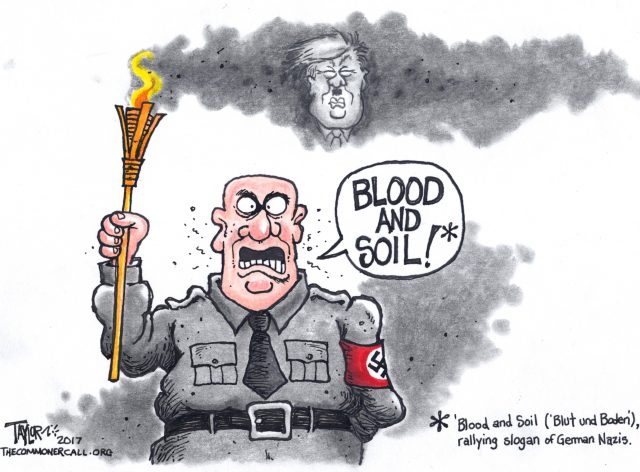
By Jake Johnson
Common Dreams (8/23/17)
While much of the nation looked on in horror as President Donald Trump delivered a speech ripped “out of a psychopathology textbook” on Tuesday night in Arizona, Sen. Bernie Sanders (I-Vt.) and Rep. John Conyers (D-Mich.) headlined a town hall-style event in Detroit, Michigan on racial and economic justice that served as a marked contrast to Trump’s “unhinged” performance.
Before Sanders approached the podium, Rev. Wendell Anthony of the Detroit Fellowship Chapel Church delivered a remarkable introduction that was quickly spread on social media.
Sanders is “trying to take down the tributes to racism and division” while also “trying to stand up for universal healthcare, stand up for jobs for everybody, stand up for income equality, stand up for tuition-free education, stand up for fair treatment and respect from law enforcement across the nation,” Anthony said.
“I want Democrats to be the party not of corporate interests, but of the working class.” —Sen. Bernie Sanders
“If you spent two minutes watching Trump tonight, spend two watching this,” a pro-Sanders group wrote on Twitter, referring to Anthony’s speech.
Speaking to an audience of more than 2,000 people, Conyers and Sanders slammed Trump while also outlining a positive vision, one that included Medicare for All, a higher federal minimum wage, and full employment.
Pointing to Trump’s insistence that “many sides” were to blame for the deadly violence in Charlottesville, Virginia, Sanders said: “We have a president who was equivocal—nice people on both sides! No! There are no nice Nazis!”
Sanders—who, according to a new poll, would handily defeat Trump in a hypothetical 2020 match-up—went on to express the urgent need to fundamentally alter America’s for-profit healthcare status quo.
“If every other major country guarantees healthcare to every man, woman, and child in their nations, by God we can do it in the United States,” Sanders said.
Conyers added to Sanders’s Medicare for All pitch a call for full employment. A decent-paying job, Conyers said, should be a “fundamental” right in the wealthiest nation on earth.
“We need jobs, justice, and peace,” Conyers said. “We need political justice and economic justice.”
Conyers and Sanders have both introduced ambitious legislation taking aim at America’s healthcare crisisand, more recently, youth unemployment.
“We need jobs, justice, and peace. We need political justice and economic justice.” —Rep. John Conyers
“Youth unemployment is one of the great crises facing our country, impacting millions of young people and their families, but it is one we rarely discuss in Washington,” Sanders wrote shortly after introducing the Employ Young Americans Now Act. Conyers introduced the same bill in the House of Representatives.
Sanders ended the Detroit town hall by acknowledging that while “there are divisions in this country on a number of issues,” most Americans are united in their desire for a government that works for the public good, not for the interests of the wealthy.
“I want Democrats to be the party not of corporate interests, but of the working class,” Sanders said. “On major issue after major issue, the American people are united in wanting a government that represents all of us and not the one percent.”
(This work is licensed under a Creative Commons Attribution-Share Alike 3.0 License.)
(Commoner Call photo, 2017. Open source and free to use with link to www.the commoercall.org)
Link to Story and Two Inspiring Videos
*****
‘Shades of 1933 Germany’: Trump’s Hostile Rally Prompts Third Reich Comparisons
By Julia Conley
Common Dreams (8/23/17)
In the wake of President Donald Trump’s “unhinged” address at a campaign-style rally in Phoenix, Arizona, former British ambassador Peter Westmacott joined many Americans in expressing shock at the president’s rhetoric on Wednesday—comparing the rally to one that might have been seen during the rise of the Nazi state in 1930s Germany.
The president spent much of his hour-long tirade railing against the press, declaring that most reporters “are really, really dishonest people, and they’re bad people” who “don’t like our country.” The press coverage of the last ten days was a special focus; since last week, Trump has faced heavy criticism for his equivocation regarding a violent white supremacist rally in Charlottesville, Virginia.

Westmacott is just the latest observer to compare Trump’s actions to those of autocrats like those of the Nazi regime. Last month the president’s speech at the annual Boy Scout Jamboree was as focused as his Phoenix address was on Trump’s ongoing battles with the free press and other adversaries, prompting comparisons to a Nazi Youth rally.
It’s beyond serious. It’s real
Writing in Foreign Policy In Focus on Wednesday, Adil E. Shamoo and Bonnie Bricker argueit’s time to take such Nazi-Trump comparisons seriously:
“For starters, both rose to power with minority support….At his peak, Hitler managed to muster just 39 percent [of the German vote]. (Contrary to myth, he never won a popular election outright.) Trump took over the Republican Party with a similar style of demagoguery and dumb luck.”
“Both Hitler and Trump have used bullying and threats to keep government officials in line. Nazi supporters intimidated, beat, and assassinated some of their opponents. Trump is no Hitler—not yet—but he’s turned his Twitter account into an intimidation tool and managed to keep the majority of his party in line with him, even with neo-Nazis chanting “Heil Trump” in the streets.”
The former ambassador’s comments coincided with an urgent condemnation by a United Nations panel focused on race relations to the Trump administration’s troubling response to white supremacists in the United States.
‘Failure at the highest political level’
Invoking its “urgent warning procedure,” The Committee on the Elimination of Racial Discrimination denounced “the failure at the highest political level of the United States of America to unequivocally reject and condemn the racist violent events and demonstrations” led by white supremacists. The group also urged the U.S. to “actively contribute to the promotion of understanding, tolerance, and diversity between ethnic groups”—values which the country has historically prided itself on promoting.
The Committee generally only gives reviews of U.N. member countries’ race relations every four or five years, but its urgent warning procedure is used for cases of unrest that could “spiral into terrible events,” according to its chair, Anastasia Crickley.
In an interview with the New York Times, Crickley expressed shock at the glowing reviewsavowed neo-Nazis gave the president after his statements on Charlottesville. “I was horrified as well by the way leaders of [the white supremacist] movement were able to state afterwards that they felt secure in their support,” she said.
The last time the panel issued such a decision was last year, when it twice criticized the government of Burundi in East Africa for not addressing its human rights abuses. Before that was in 2014, in a decision concerning the so-called Islamic State group’s attacks against civilians in Iraq.
(Commoner Call cartoon, 2017. Open source and free to use with link to www.thecommonercall.org )

